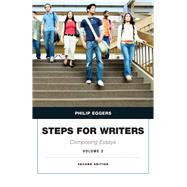
Note: Supplemental materials are not guaranteed with Rental or Used book purchases.
Purchase Benefits
What is included with this book?
Introduction: Visualizing the Essay
Student Essay
Step One: Developing Your Own Thinking, Writing, and Learning Process
1. Prewriting
Prewriting Experiments: Freewriting, Focused Writing, Brainstorming, Outlining, Clustering, Cubing
Interacting with Your Readers
Identifying Your Purpose
Prewriting Activities: A Glimpse of a Student Writer at Work
Writing Tip #1Writing Exercises: Basic, Intermediate, Challenge
Proofreading Practice: Identifying Sentence Divisions in Your Prewriting
Activities: Basic, Intermediate, Challenge
2. Making a Point
Thesis Statements
Introductory Paragraph
Writing Tip #2
Writing Exercises: Basic, Intermediate, Challenge
Proofreading Practice: Agreement of Subjects/Verbs: Basic, Int., Challenge
3. Developing Your Body Paragraphs and Making Conclusions
Explaining and Illustrating Ideas in Your Body Paragraphs
Applying Techniques of Development
Choosing Modes of Development
Writing Tip #3
Writing Exercises: Basic, Intermediate, Challenge
Concluding Paragraphs
Proofreading Practice: Special Problems with Agreement: Basic, Intermediate, Challenge
4. Global Revising: Doing an Extreme Makeover
Moving from Draft to Essay: A Glimpse of a Student Writer at Work
Testing Your Thesis: Looking for Digressions and Weak Spots
Achieving Continuity through Transitions
Improving Your Style: Breaking up, Varying and Combining Sentences
Interacting with Your Reader (reading aloud to others)
Peer Review Questions
Writing Tip #4
Writing Exercises: Basic, Intermediate, Challenge Proofreading Practice: Subordination: Basic, Intermediate, Challenge
5. Putting on the Final Touches
Improving Word Choice; Eliminating Wordiness
Proofreading Aloud; Locating Your Patterns of Error
Using Your Spelling and Grammar Check
Writing Tip #5
Writing Exercises: Basic, Intermediate, Challenge
Proofreading Practice: Spelling: Basic, Intermediate, Challenge:
Step Two: Writing Essays Based on Your Own Experience and Perceptions
6. Describing a Situation, Person, or Group
Visualizing Your Subject and Giving It Meaning
Student Essay
Organizing a Description
Example by a Published Author: Using Details
Writing Tip #6
Writing Exercises:Basic, Intermediate, Challenge
Essay Topics: Descriptive Writing
Peer Review Questions
Proofreading Practice: Adjectives & Adverbs: Basic, Intermediate, Challenge
7. Telling a Story to Make a Point
Organizing Chronologically
Telling a Meaningful Story
Student Essay: Telling a Story to Make a Point
Example by a Published Author
Writing Tip #7
Writing Exercises:Basic, Intermediate, Challenge
Essay Topics: Narration
Peer Review Questions
Proofreading Practice: Past Tense: Basic, Intermediate, Challenge
8. Enumerating Examples
Student Essay
Example by a Published Author
Writing Tip #8
Writing Exercises: Basic, Intermediate, Challenge
Essay Topics: Illustrating with ExamplesPeer Review Questions
Proofreading Practice: Parallelism: Basic, Intermediate, Challenge
9. Defining a Term
Student Essay
Example by a Published Author
Examples of Short Definitions
Limiting the Scope of Your Definition
Examining Your Subject from Different Angles
Giving Examples of the Concept
Writing Tip #10Writing Exercises: Basic, Intermediate, Challenge
Essay Topics: Definition
Peer Review Questions
Proofreading Practice: Who and Which Clauses: Basic, Int., Challenge
Step Three: Writing Essays Based on Your Reading and Research
10. Making a Comparison
Comparing and Contrasting as a Way of Knowing
Types of Comparison
Gathering Facts on Both Subjects
Exploring Similarities and Differences: A Student Writer at Work
Organizing Your Material
Student Essay: Exploring Similarities and Differences
Example by a Published Author
Writing Tip #9
Writing Exercises: Basic, Intermediate, Challenge
Essay Topics: Comparison and Contrast
Peer Review Questions
Proofreading Practice: Modifiers in Comparisons: Basic, Int., Challenge
11. Explaining a Process or Procedure
“How To” Writing: Giving Clear Instructions
Student Essay: Explaining a Procedure
Analyzing a Process: Making the Connections
Researching Facts on the Process
Example by a Published Author: Analyzing a Process
Writing Tip #11
Writing Exercises: Basic, Intermediate, Challenge
Essay Topics: Procedural Writing
Peer Review Questions
Proofreading Practice: Present and Progressive Tenses: Basic, Intermediate, Challenge
12. Analyzing Cause and Effect
Student Essay Example by a Published Author
Being Logical: Causes vs. Coincidences
Identifying all the Causes and Effects
Finding the Necessary Information
Writing Tip #12
Writing Exercises: Basic, Intermediate, Challenge
Essay Topics: Cause and Effect
Peer Review Questions
Proofreading Practice: Compound and Complex Sentences
13. Arguing Persuasively
Student Essay
Example by a Published Author
Guidelines for Persuasive Writing
Stressing the Argument, Not the Personalities
Approaching the Argument from Several Angles
Researching and Presenting Supporting Material
Writing Tip #13
Writing Exercises: Basic, Intermediate, Challenge
Essay Topics: Arguing Persuasively
Peer Review Questions
Proofreading Practice: Sentence Combining: Basic, Intermediate, Challenge
14. Writing a Research Paper
Making Sense with Sources Summarizing and Paraphrasing
Quoting: the Long and Short of It
Using the Library and Internet
Analyzing Source Material; Evaluating Web Sites
Avoiding Plagiarism
Writing a Bibliography
Sample Short MLA paper
Writing Tip #14
Research Paper Checklist
Writing Exercises:Basic, Intermediate, Challenge
Essay Topics: Research Paper
Peer Review Questions
Proofreading Practice: MLA Form: Basic, Intermediate, Challenge
15. Writing about Literature
Methods of Interpreting a Story, Play, or Poem
Student Essay
Example by a Published Author
Analyzing vs. Paraphrasing
Developing a Point by Using the Text
Writing Tip #15
Writing Exercises: Basic, Intermediate, Challenge
Essay Topics: Writing about Literature
Peer Review Questions
Proofreading Practice: Quoting Correctly from Literary Works,
Basic, Intermediate, Challenge
Appendix: Punctuation Handbook
Index of Grammar Topics
Adjectives and Adverbs
Agreement of Subject and Verb
Comma Splice
Compound and Complex Sentences
D Endings
Fragments
Irregular Verbs
Parallelism
Past Tense
Present and Progressive Tenses
Pronoun Case
Quoting
Run-on Sentences
S Endings
Sentence Combining
Sentence Divisions
Spelling
Subordination
Who and Which Clauses
Wordiness
The New copy of this book will include any supplemental materials advertised. Please check the title of the book to determine if it should include any access cards, study guides, lab manuals, CDs, etc.
The Used, Rental and eBook copies of this book are not guaranteed to include any supplemental materials. Typically, only the book itself is included. This is true even if the title states it includes any access cards, study guides, lab manuals, CDs, etc.